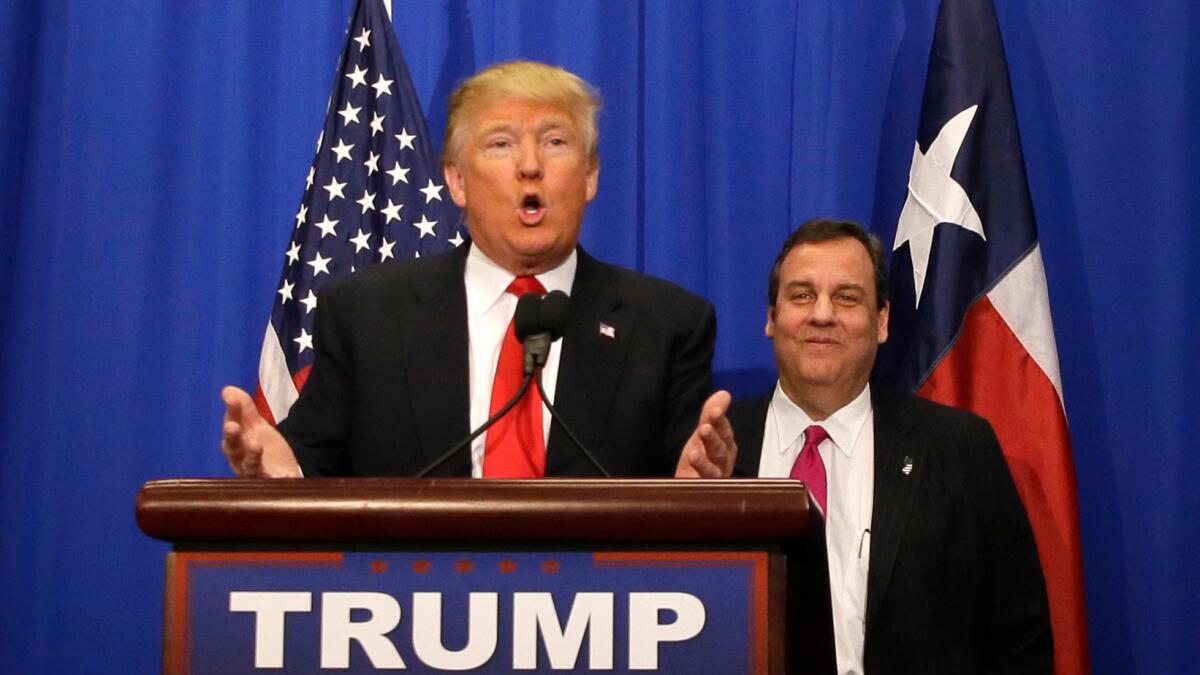Column: Help wanted: A veep for Donald Trump

- Share via
Help wanted: Seasoned Republican politician with Washington experience. Must have high energy, conservative credentials and a strong stomach. Job requires working for mercurial boss who provokes needless crises without warning. On paper, you’ll be his deputy, but this chief executive prides himself on ignoring others’ advice. The successful candidate will roll with the punches and subordinate his/her public image to the boss’s whims. Four-year, no-exit contract; once you’re in, you’re in.
Would anybody want this job?
As Donald Trump’s scorched-earth style has driven his poll numbers downward, the question isn’t only whom he’ll pick as his running mate; it’s also whether leading Republicans are willing to shackle their futures to his.
“If you take the job, you’re betting your reputation and your career on Donald Trump,” said Vin Weber, a former Republican congressman from Minnesota who, it must be noted, is not a fan.
The presumptive nominee has “an albatross around his neck,” agreed David Winston, a longtime GOP pollster. “The share of voters who have an unfavorable opinion of Trump is higher than we’ve ever seen for a presidential candidate. That means he isn’t just vetting potential running mates; he’s going to have to recruit them.”
If Trump loses the general election, his No. 2 risks collecting a share of the blame. If Trump wins, the new vice president gets to spend four years contending with a boss whose reality TV catchphrase was: “You’re fired.”
Small wonder that the list of prominent Republicans who don’t want to be considered is as long as those who are signaling interest.
See the most-read stories in National News this hour >>
Nominees often find their running mates among the rivals they defeated in the primaries, but Sen. Ted Cruz, Sen. Marco Rubio and Gov. John Kasich are all in the “not me” camp.
Trump has said he would like a vice president with experience in Congress, “somebody that can help me with legislation.” But some of his party’s top figures on Capitol Hill don’t appear interested, either.
House Speaker Paul Ryan would be a logical candidate; he was Mitt Romney’s running mate in 2012, and he’s beloved by many conservatives.
But while Ryan has formally endorsed Trump, he has repeatedly criticized the real estate mogul, slamming his criticism of a Mexican American federal judge as “the textbook definition of a racist comment.” Besides, Ryan is passionate about cutting future spending on Social Security and Medicare; Trump disagrees. That marriage isn’t going to happen.
Contrary to popular belief, it’s not unprecedented for politicians to decline an offer to run for vice president. It’s not even unusual.
The chairman of the Senate Foreign Relations Committee, Sen. Bob Corker, has traveled to Trump Tower in New York to offer foreign policy advice. But if Corker was initially interested, he’s sounding less enthusiastic now.
Last week, the senator said he was disappointed by Trump’s statements after the mass shooting in Orlando, Fla., in which the presumptive nominee accused U.S. Muslims of harboring terrorists and suggested that President Obama might secretly sympathize with extremists.
“In an effort to be constructive, I have offered public encouragement [to Trump], but I must admit that I am personally discouraged by the results,” Corker told me.
Who would take the job?
Newt Gingrich, the former speaker of the House, has been virtually campaigning for the role.
Join the conversation on Facebook >>
“Trump was right” about Orlando, he told conservative columnist Byron York. “Trump has been warning again and again that this has been getting more dangerous.”
Trump and Gingrich are also in broad agreement on domestic policy; like Trump, Gingrich criticized Romney and Ryan for proposing cuts to Medicare spending in 2012.
New Jersey Gov. Chris Christie, one of the first primary candidates to endorse Trump, seems eager too — all too eager.
He’s become a fixture on Trump’s campaign, to the extent that The New Yorker reported that he “has transformed himself into a sort of manservant,” delivering the candidate’s lunch from McDonald’s. (The governor’s office issued an indignant denial, at least about the lunch.)
Christie’s term as governor ends in January 2018, and he can’t run again. But it’s not clear what he’d bring to the ticket; his job approval in New Jersey has plummeted and he has no Washington experience.
Trump has said he would consider Sen. Jeff Sessions of Alabama, the first member of the Senate to endorse him. But Sessions has pointed out that he’d be a bad strategic choice, since the GOP shouldn’t need extra help in the Deep South.
The presumptive nominee has also said he likes Oklahoma Gov. Mary Fallin, a governor with solid conservative credentials; she has said she’s honored to be considered.
Contrary to popular belief, it’s not unprecedented for politicians to decline an offer to run for vice president. It’s not even unusual.
According to Joel K. Goldstein of St. Louis University, no fewer than seven Democrats turned down then-Sen. George S. McGovern in 1972, including Sens. Edward M. Kennedy and Walter F. Mondale. Kennedy went on to serve as one of the most powerful senators of modern times. Mondale served as vice president under Jimmy Carter and became the 1984 Democratic presidential nominee.
So it doesn’t hurt a politician’s career to turn down the second spot on the presidential ticket. But it’s definitely not a good sign for the candidate at the top.
Twitter: @DoyleMcManus
Follow the Opinion section on Twitter @latimesopinion or Facebook
MORE FROM OPINION
Even in the Wild West, there were rules about carrying concealed weapons
Climbing a ‘Stairway’ to the courthouse
More to Read
A cure for the common opinion
Get thought-provoking perspectives with our weekly newsletter.
You may occasionally receive promotional content from the Los Angeles Times.









